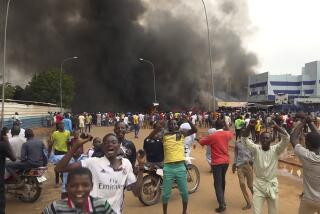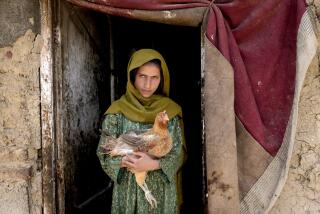U.S. Envoy Calls Afghan Regime a ‘Building Without Its Girders’
- Share via
NEW DELHI — Describing the Afghan government as “a building without its girders,” the head of the closed U.S. Embassy in Afghanistan predicted Wednesday that the Soviet-backed government of President Najibullah will fall within months.
Jon Glassman, the U.S. charge d’affaires in Kabul until he was evacuated Tuesday, told reporters here that splits within Najibullah’s ruling party and armed forces are likely to bring down his government soon after the Soviets withdraw the last of their 115,000 troops from Afghanistan. The withdrawal is expected to be completed in less than a week, although under the Geneva accords of last April, the Soviets have until Feb. 15.
“It’s a general consensus among most informed observers that the life of the regime is likely to be short,” Glassman said.
“In Kabul, most of the Western and neutral diplomats are betting between now and July, but this is all just crystal-ball gazing.”
He said a military coup “is one of the possibilities that has to be considered.”
Glassman, who arrived here Tuesday night from Kabul along with 10 other members of the embassy staff, said such a coup would be staged either by hard-line Afghan Communist Party members opposed to the Soviet withdrawal or by military officers who sympathize with the U.S.-backed moujahedeen , Muslim fighters who have battled the Soviet occupation for the past nine years.
In Moscow, Foreign Ministry spokesman Vadim Perfilyev rejected Glassman’s predictions. He criticized Western countries for closing their embassies, saying there was “no reason for concern” over the safety of foreign .diplomats in the country.
The Afghan government has charged that the closing was politically calculated to sow panic and destabilize the regime. But diplomats from East Bloc and nonaligned nations are also leaving, according to news agency reports from Kabul.
‘Lives Were in Danger’
Explaining Monday’s closing of the U.S. Embassy, Glassman said, “The decision to pull out now is one that was taken in light of the fact that American lives were in danger.
“I don’t think our departure will affect one way or another the evolution of events. The evolution of events has been foreordained by 10 years of war, 10 years of foreign intervention.”
Glassman indicated that a rebel blockade of goods destined for Kabul continues to be effective. The charter flight that brought the American diplomats to New Delhi was forced to stop and refuel in the Indian city of Amritsar because, Glassman said, there was no aviation fuel available in Kabul.
“It’s not a good situation,” he said.
However, a Times reporter visiting Kabul on Wednesday saw several commercial flights refueling and operating from the Kabul airport. But, as has been the practice for more than a year, Soviet commercial flights were escorted by four helicopter gunships, firing flares to draw off any U.S.-supplied, heat-seeking Stinger missiles that the rebels might fire.
Severe shortages of bread, Afghanistan’s staple food, have caused long lines outside bakeries beginning as early as 4 a.m. But most independent observers in the city said they feel the situation is not as serious as the Americans have portrayed it.
“There’s no starvation and the situation is not getting tense yet, but maybe that’s just because of the Afghans’ mentality--they stay calm,” said one European doctor in Kabul. “You can feel there’s shortage, but it’s not a tense situation.”
Najibullah’s government has reassured Kabul’s 2 million residents that the government is stable and capable of keeping the peace.
The commander of the Soviet troops in Afghanistan promised Tuesday that Soviet bombing raids from Soviet territory will stop after the pullout is complete.
Glassman called the promise by Lt. Gen. Boris Gromov “welcome news” but sharply criticized the Soviets for the bombing still taking place, sorties that the State Department have labeled a “scorched-earth policy” and alleged are being launched from within the Soviet Union against Afghan villages.
Gromov said the bombing attacks are required to keep open a key road, the Salang Highway, between Kabul and the Soviet border. He rejected the “scorched earth” characterization.
More to Read
Sign up for Essential California
The most important California stories and recommendations in your inbox every morning.
You may occasionally receive promotional content from the Los Angeles Times.













